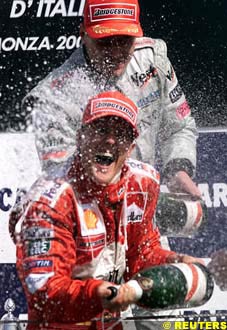 An image, they say, is worth a thousand words. And so it was at this year's Italian Grand Prix, when Michael Schumacher broke down during the post-race press conference and showed the whole world that, he too, is human after all.
An image, they say, is worth a thousand words. And so it was at this year's Italian Grand Prix, when Michael Schumacher broke down during the post-race press conference and showed the whole world that, he too, is human after all.
For Schumacher himself, his third Italian Grand Prix win for Ferrari meant coming back from a very disappointing couple of races where he lost the championship lead, but, most importantly, it meant equalling the victory record of the late Ayrton Senna, with 41 wins.
It was no secret that the great Senna was Schumacher's hero and inspiration when he started his racing career, but it took 142 races to really show the admiration and respect the German felt for the Brazilian.
Since the start of his career, and especially since Senna's tragic death in 1994, Schumacher has lived under the long eternal shadow of Ayrton's memories and achievements and has always been compared to him. The battle between these two great drivers lasted only the first three races of the 1994 championship, so equalling his idol's record, at his team's home circuit, after a perfect drive, and after getting his championship challenge back on track, was more than Michael Schumacher, even Michael Schumacher, could handle.
Schumacher's championship rival, Mika Hakkinen, was also moved by the German's attitude and could not help being overcome with emotion, having to ask for a break before answering any questions.
For the second year running, tears were the main protagonists of the Italian Grand Prix. The pictures of Hakkinen crying over his balaclava after his retirement in last season's race were on the headlines for a couple of months, and this year's events will probably last much longer than that.
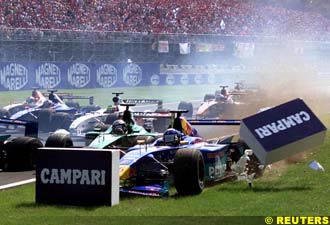 Unfortunately, those tears were not only of joy, as the Formula One circus lost yet another life during a tragic race. Paolo Gislimberti was not a top driver, not even part of a team, yet as Michael Schumacher proved, we are all human, and all lives are as important.
Unfortunately, those tears were not only of joy, as the Formula One circus lost yet another life during a tragic race. Paolo Gislimberti was not a top driver, not even part of a team, yet as Michael Schumacher proved, we are all human, and all lives are as important.
The race itself proved once more that this season's title will, unless something strange occurs, go down to the wire, as Ferrari and Schumacher seem to have worked miracles on their cars, and especially on their engines, to recover the lost ground to McLaren.
Of course, this was Monza and the Italian team seems to pull out something special for this race every season, but this victory was good enough to stop Hakkinen's amazing charge to his third consecutive title, and it will give wings to Ferrari for the three remaining races of the 2000 season.
There was nothing Hakkinen and McLaren could do against their rivals and, considering how close the Finn was to ending up out of the race on the first lap accident, he can be happy having left Monza still leading the championship.
What occurred at the second chicane was a tragedy, no doubt about that, but it should not lead to yet another crusade to improve safety, at least where the cars are concerned. When Formula One cars crash into one another at nearly 300km/h, it is inevitable that debris will fly all over the place - after all, this is open wheel racing.
As we saw during the huge accident, the cars are safe enough for their drivers, and not even Pedro de la Rosa, whose Arrows rolled several times, was injured.
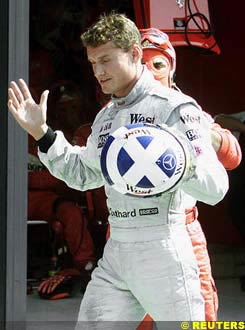 Whether the drivers are behaving safely, however, is not so clear, and the FIA should make some important decisions about that. Furthermore, having the safety car on track for ten laps, while the injured marshal was receiving emergency medical treatment, does not bode well for the Ruling Body's image.
Whether the drivers are behaving safely, however, is not so clear, and the FIA should make some important decisions about that. Furthermore, having the safety car on track for ten laps, while the injured marshal was receiving emergency medical treatment, does not bode well for the Ruling Body's image.
Qualifying
Michael Schumacher had to do his best to ensure his sixth pole position of the season, in front of thousands of tifosi, who could not believe their eyes when they saw the only real challenger for the German was his own Ferrari teammate Rubens Barrichello.
The Italian team was the class of the field and, despite Mika Hakkinen's efforts, the McLaren driver could do nothing to avoid the first all-scarlet front row of the season.
Schumacher, who jumped onto the track 25 minutes into the session, had one of his attempts spoiled after missing the first chicane on his initial flying lap. This meant that the German could not try to defend his fastest time during the dying moments of the session, but fortunately for him, his time was not bettered.
"I messed up my first lap, running wide at the first chicane, but the car felt quick, which is why I decided to go for a second lap, even if it was a bit of a risk," explained Schumacher. "It was therefore an unusual qualifying session as I finished before the end. I must say I would rather have been in the car than sitting watching the screen."
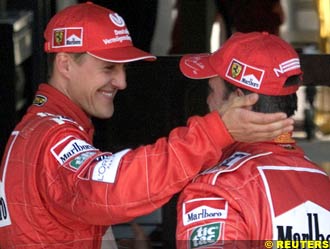 The German improved his initial time on his second attempt, but with 20 minutes remaining, Ferrari's good form became evident when Barrichello jumped up to first place by only 0.014 of a second. However, this was Michael's party and some ten minutes later he relegated his teammate to second place, snatching pole position by a mere two hundreds of a second.
The German improved his initial time on his second attempt, but with 20 minutes remaining, Ferrari's good form became evident when Barrichello jumped up to first place by only 0.014 of a second. However, this was Michael's party and some ten minutes later he relegated his teammate to second place, snatching pole position by a mere two hundreds of a second.
Despite having lost what would have been a dream result for him, Barrichello was delighted with second place on the grid. "Of course it's always better to be first, but I am happy to be on the front row. It's a great result for Ferrari at their home track," the Brazilian said.
Hakkinen settled for third spot, after constantly improving his time throughout the session. The Finn complained about the lack of grip from his McLaren out of the slow corners, so he decided to take the spare car for the last minutes, but he then suffered an unusual problem with his Mercedes engine.
"There were one or two areas where it could have been better, and for my last two runs I had a massive misfire. I could have gone quicker," confessed Hakkinen.
Jacques Villeneuve was the surprise of the day, setting the fourth fastest time and achieving BAR's best ever qualifying position, courtesy of the amazing power of the Honda engine. The Canadian, who was the first driver to get out on track, ten minutes into the session, took advantage of a specially prepared Honda unit and was very happy with the result.
"It feels great to qualify fourth - the team's best ever position," admitted Villeneuve, who gave Honda something to celebrate on their 200th Grand Prix. "Hopefully we will be able to challenge for a podium finish tomorrow."
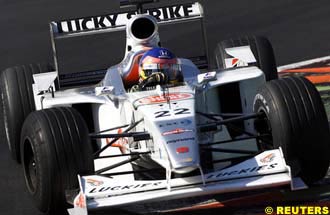 As was the case a fortnight earlier in Belgium, David Coulthard had a disappointing qualifying session and ended up in fifth place. And just as it happened in Belgium, he clashed with Heinz-Harald Frentzen, who spoiled his last attempt in the dying moments. It was no surprise, then, that the Scot was not happy. "I didn't manage to get all my best sector times together to make one fast lap and also experienced problems finding the optimum balance," Coulthard later complained.
As was the case a fortnight earlier in Belgium, David Coulthard had a disappointing qualifying session and ended up in fifth place. And just as it happened in Belgium, he clashed with Heinz-Harald Frentzen, who spoiled his last attempt in the dying moments. It was no surprise, then, that the Scot was not happy. "I didn't manage to get all my best sector times together to make one fast lap and also experienced problems finding the optimum balance," Coulthard later complained.
Jarno Trulli was sixth, after a very difficult practice session, where he and his Jordan teammate Frentzen ended up 12th and 19th. But the team worked hard and both drivers could make it into the top ten, with Ralf Schumacher's Williams separating them in seventh place, after another strong showing from the team and their engine provider BMW.
The young German was one of many drivers who had problems to make it through the revised first chicane, and he was also concerned about how tight it would be at the start of the race. "Considering the close times achieved by drivers among the top six - some of which are not fighting for the lead of the drivers' championship - tomorrow, for the first lap, it's going to be quite tight into the new chicane," he predicted.
Qualifying Results
Pos Driver Team Times
1. M.Schumacher Ferrari 1:23.770 248.523 km/h
2. Barrichello Ferrari 1:23.797 + 0.027
3. Hakkinen McLaren Mercedes 1:23.967 + 0.197
4. Villeneuve BAR Honda 1:24.238 + 0.468
5. Coulthard McLaren Mercedes 1:24.290 + 0.520
6. Trulli Jordan Mugen-Honda 1:24.477 + 0.707
7. R.Schumacher Williams BMW 1:24.516 + 0.746
8. Frentzen Jordan Mugen-Honda 1:24.786 + 1.016
9. Fisichella Benetton Playlife 1:24.789 + 1.019
10. de la Rosa Arrows Supertec 1:24.814 + 1.044
11. Verstappen Arrows Supertec 1:24.820 + 1.050
12. Button Williams BMW 1:24.907 + 1.137
13. Wurz Benetton Playlife 1:25.150 + 1.380
14. Irvine Jaguar Cosworth 1:25.251 + 1.481
15. Salo Sauber Petronas 1:25.322 + 1.552
16. Diniz Sauber Petronas 1:25.324 + 1.554
17. Zonta BAR Honda 1:25.337 + 1.567
18. Herbert Jaguar Cosworth 1:25.388 + 1.618
19. Alesi Prost Peugeot 1:25.558 + 1.788
20. Heidfeld Prost Peugeot 1:25.625 + 1.855
21. Gene Minardi Fondmetal 1:26.336 + 2.566
22. Mazzacane Minardi Fondmetal 1:27.360 + 3.590
The Race
The big question before the start of the race was probably not if there was going to be an incident on the first chicane, but how many cars would be involved in it. Put a very tight track, add a 90-degree right hander, and mix it with 22 Formula One drivers anxious to gain as many places as possible, and the incidents will be an inevitable.
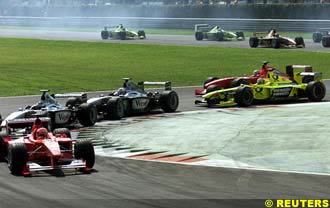 Michael Schumacher finally made a good start from pole position, while Jean Alesi stalled at the back of the grid. In front, Rubens Barrichello lost several places and the opportunity to help his teammate during the race, while Mika Hakkinen got right behind Schumacher's rear wing, although sensibly did not try to force his way at the end of the straight.
Michael Schumacher finally made a good start from pole position, while Jean Alesi stalled at the back of the grid. In front, Rubens Barrichello lost several places and the opportunity to help his teammate during the race, while Mika Hakkinen got right behind Schumacher's rear wing, although sensibly did not try to force his way at the end of the straight.
As all the cars arrived at the first chicane the inevitable happened and Eddie Irvine banged wheels with Mika Salo's Sauber, who lost control of his car and ended up hitting his own teammate Pedro Diniz. The result: Irvine retired, Diniz lost his front wing, and Salo had to complete a whole lap with a punctured tyre and a broken engine cover, before entering the pits for repairs.
Only one retirement after the first chicane was less than anyone had expected, but the worst would come moments later. As the field was approaching the second chicane, Barrichello tried to go on the inside of Jarno Trulli. Heinz-Harald Frentzen, who was right behind the Ferrari driver, misjudged his braking point and turned right to avoid hitting Barrichello, only to crash into Trulli's Jordan, and later into the Brazilian's car, also taking David Coulthard in the process.
"Barrichello changed line and braked unexpectedly early, I could not turn in time to avoid him, so I hit him," explained Frentzen. But the Ferrari driver had a very different story to tell. "He was totally responsible for what happened and he should be banned," said Barrichello. "It is completely unbelievable that he should think I was braking early. I was overtaking Jarno Trulli and I was braking as late as I could. He should not be using the car in front of him as a reference for his braking points."
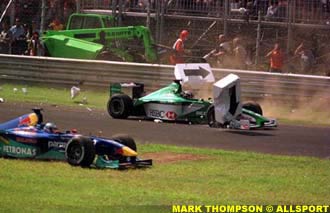 As both Jordans collided at almost 300km/h, their wheels, as well as pieces of bodywork and suspension, flew off of the track at a staggering speed, one of the wheels hitting fire marshal Paolo Gislimberti. Coulthard later revealed that the marshal in fact had moved from his safety zone. "I knew where he was standing," he said. "He was on the edge of the corner on the right hand side by the barrier."
As both Jordans collided at almost 300km/h, their wheels, as well as pieces of bodywork and suspension, flew off of the track at a staggering speed, one of the wheels hitting fire marshal Paolo Gislimberti. Coulthard later revealed that the marshal in fact had moved from his safety zone. "I knew where he was standing," he said. "He was on the edge of the corner on the right hand side by the barrier."
Further back, the impact of the incident was still at full force, and Pedro de la Rosa ran into the back of Johnny Herbert's Jaguar, launching his Arrows car into a series of rolls before hitting Barrichello's standing car, miraculously missing Coulthard, and ending up upside down.
"I just saw the yellow flags and braked and then saw pieces of car all over the place, lots of tyre smoke and after the smoke cleared there were two cars travelling really slowly and I just couldn't slow down my car enough," de la Rosa explained.
Six drivers were out of the race as a consequence, and Ricardo Zonta had to come into the pits to get his car repaired. Johnny Herbert could go back to the pits with a three-wheeled Jaguar, but the other five cars stood there on the gravel trap, with debris all over the place, and the marshal being attended to by the medical staff on the side the track. Controversially, FIA's safety delegate, Charlie Whiting, decided not to red-flag the race and abort the first start, but instead had the safety car come out and stay ahead of the remaining pack for ten laps.
In the mean time, 30-year old Gislimberti was taken to the circuit's medical centre and then to a hospital in Monza, where he was declared dead as a result of the head and chest injuries he sustained.
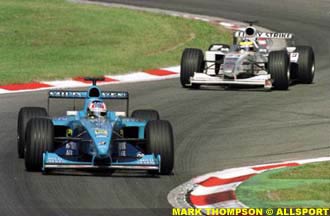 As the safety car was about to leave the track, the leading cars slowed right down, in particular Michael Schumacher, but not Jenson Button, who seemed to have lost concentration and was thus forced to swerve to the right to avoid hitting his teammate Ralf Schumacher. The young Brit hit the barriers and seconds later, as he tried to make it through the Parabolica turn, his Williams did not react and he ended his race against the tyre wall.
As the safety car was about to leave the track, the leading cars slowed right down, in particular Michael Schumacher, but not Jenson Button, who seemed to have lost concentration and was thus forced to swerve to the right to avoid hitting his teammate Ralf Schumacher. The young Brit hit the barriers and seconds later, as he tried to make it through the Parabolica turn, his Williams did not react and he ended his race against the tyre wall.
"When everyone suddenly braked just as I began accelerating flat out I couldn't go anywhere else," Button explained. "But when I got to the turn there was just no grip, as my tyres were covered in grass."
After eleven laps, the race finally was finally under way, with Michael Schumacher in front of Hakkinen, Jacques Villeneuve, Ralf Schumacher, Giancarlo Fisichella and Jos Verstappen, who passed Alex Wurz at the end of the straight. Schumacher began to pull away quickly from Hakkinen and the rest of the field, as Zonta, who was at the back after his early stop, started his charge to the front, overtaking Nick Heidfeld, Marc Gene and Wurz, to elevate himself to seventh place by lap fourteen.
A lap later, while running comfortably in third place, Villeneuve retired with an electrical problem on his BAR, ending the team's best performance of the season. Also on his best performance of the year was his teammate Zonta who, on a two-stop strategy, was able to pass Giancarlo Fisichella, Ralf Schumacher and Jos Verstappen to climb up to third spot. Verstappen was also flying and quickly passed Ralf for fourth position. Meanwhile, in front, Schumacher continued to increase his advantage over Hakkinen, who was incapable of following the German's pace, complaining of poor balance on his McLaren.
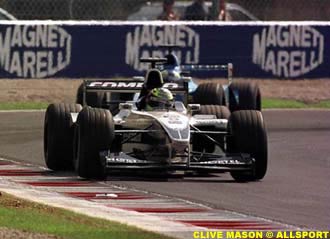 After spending so many laps behind the safety car, it became obvious that the teams would delay their pitstops as much as possible, except for BAR, who brought in Zonta on lap 23 out of the 53, making him drop to eleventh place. However, the Brazilian made up for the lost ground again and moved up to sixth place before getting stuck behind Wurz's Benetton and stopping for the second time on lap 36, even before the leaders made their first stop.
After spending so many laps behind the safety car, it became obvious that the teams would delay their pitstops as much as possible, except for BAR, who brought in Zonta on lap 23 out of the 53, making him drop to eleventh place. However, the Brazilian made up for the lost ground again and moved up to sixth place before getting stuck behind Wurz's Benetton and stopping for the second time on lap 36, even before the leaders made their first stop.
With Michael Schumacher and Hakkinen more than 30 seconds ahead of third placed Ralf Schumacher, the Ferrari driver finally made his pitstop on lap 39, when he had a gap of around ten seconds over the Finn. The German rejoined in second place, ahead of his brother, the Benettons of Fisichella and Wurz, Verstappen, and Zonta, who was once again charging to the front.
Hakkinen pitted three laps later, with only twelve to go, and came out again more than eleven seconds behind Schumacher. Ralf and Fisichella came in for their scheduled stops on lap 44, but the Italian suffered a clutch problem and lost more than a minute before he was able to rejoin the race, definitely out of contention.
Hakkinen was now the fastest man on track, lapping a full second and a half faster than Schumacher on occasions, and with three laps remaining, the Finn was 6.2 seconds behind his rival. "We made some modifications during the stop," Hakkinen explained, "but it was not enough. Added to that, the couple of Minardis didn't make it easy to overtake."
But despite the McLaren driver's pressure, Michael Schumacher crossed the finish line in first place, obtaining a very important win and the most emotional one of his entire career, reviving once more the "Monza miracle." For the first time, the ever cold and analytic German was almost speechless. "I have no vocabulary to express my feelings except that I am happy and exhausted," he said.
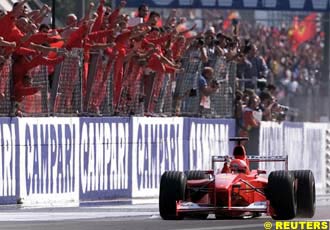 Hakkinen finished second and saw his championship lead reduced to two points with three races remaining, while Ralf Schumacher completed a podium filled by the same men who visited it at Spa two weeks earlier.
Hakkinen finished second and saw his championship lead reduced to two points with three races remaining, while Ralf Schumacher completed a podium filled by the same men who visited it at Spa two weeks earlier.
Jos Verstappen was fourth for the Arrows team, while Alex Wurz finally made it to a point scoring position, fifth in his Benetton. The last point of the race, and a worthy one indeed, went to Ricardo Zonta in the BAR.
As we saw at Monza, Formula One is a very unpredictable sport, on and off the track, and the championship now moves into the unknown, to Indianapolis, for the long awaited return to the USA and the first ever visit to the new F1 Indy track. No one can predict what will happen there, but, just in case, don't forget your Kleenex.
Race Results

